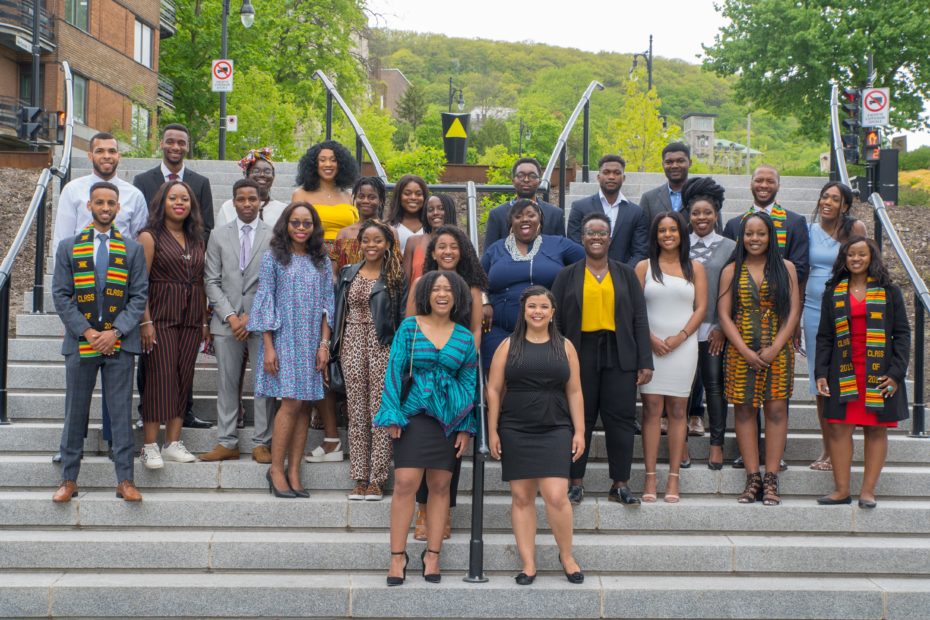
It was exhilarating, frustrating, maddening and liberating. And now it’s over.
The Black students of the Class of 2019 celebrated the end of their three- or four-year stints at McGill on Wednesday, May 29, with a convocation cocktail party and reception at the Faculty Club. The inaugural Black Grad marked the first-ever graduation celebration for Black students at McGill. In all, some 40 Black students crossed the stage to accept their degree at Spring 2019 Convocation.
In her keynote address, Montreal historian and writer Dorothy Williams urged students to remain curious throughout life and to read and learn – always, and not only in their field. Williams, who received her PhD from McGill in 2006 and writes about Black Canadian history, specifically Black Montreal history, struck a note of hope to about 150 assembled students, faculty and staff, congratulating the graduating class for what they have accomplished, and anticipating what they will achieve.
Showcasing the rich history of Black student groups
Christelle Tessono, president of McGill’s Black Students’ Network and one of the organizers of Black Grad, said that the idea for the celebration came from other universities, including Harvard, Yale and the University of Toronto, that are starting to acknowledge the contributions of Black students and other minorities.
“The point is to assert our history here on campus, as well as our successes,” Tessono told the Reporter. “I did some research on Black student groups [at McGill] in one of my history classes last semester, and I realized that we have such a rich history. So, events like this can be a great way to showcase that.”
Despite the small number of Black students at McGill, Tessono said she was struck by how many Black students are in leadership roles.
“A lot of my Black peers take on leadership positions and do a lot of interesting work for the broader McGill community,” she says. “It turns out Black students have always been in leadership positions at McGill. In the 1940s, they were presidents of their residences, their halls, they were on varsity teams, some even won Olympic medals [such as Dr. Phil Edwards]. They were presidents of debate teams – they were extremely involved on campus.”
“Extraordinary drive, ambition and talent”
McGill history professor Suzanne Morton said that “any Black student at McGill is an overachiever. Enough things were going against them. They have extraordinary drive, ability and talent.”
Black people make up nearly six per cent of the Greater Montreal population, according to the latest figures collected in the 2011 National Household Survey, but, says Prof. Morton, “the McGill student body does not look like the city of Montreal.”
Tessono said that she’s usually the only Black student in her political science classes. She and several other Black students interviewed said that one of the most common concerns among Black students is isolation – as well as the occasional instance of racism, usually subtle, and of belittlement. The lack of representation in numbers can result in a lack of representation in the material covered in class, she said.
Tessono recalls one class when a white student derided the ideas of Frantz Fanon, a Martinique writer and national liberation activist, as nonsensical.
“He was saying that colonization was not that bad. It’s not understanding Black people’s perspective, often reducing them to negative stereotypes.”
Raphael Ajima, a Nigerian student set to graduate in November in International Development Studies with a double minor in Economics and Social Entrepreneurship, said he bites his tongue a lot in class.
“Sometimes you really can’t believe the things people say about the developing world, mostly about African nations,” he said. “But you learn to not get shocked. You let it go.”
“I’ve worked and studied in France, the U.S. and South America, and Canada is the most progressive country I’ve ever been to,” said Ajima, who is hoping to get Canadian citizenship.
“And to be honest, I find McGill is progressive, too.”
This spring, Ommu-Kulsoom J. Abdul-Rahman graduated with honours in Political Science and Islamic Studies, with a minor in African Studies. The valedictorian for the Faculty of Arts, McGill senator and president of the World Islamic & Middle Eastern Studies Student Association said that she also is usually the only Black person in a class, “which is weird.”
But she agreed that there “is definitely a change happening” – for the better.
Students are more receptive in general to the ideas of Black students, and her mentor, Professor Khalid M. Medani, jointly appointed in the Political Science Department and the Institute of Islamic Studies, “has really helped me with all aspects of my degree,” said Abdul-Rahman, who is off to graduate school in the United Kingdom.
